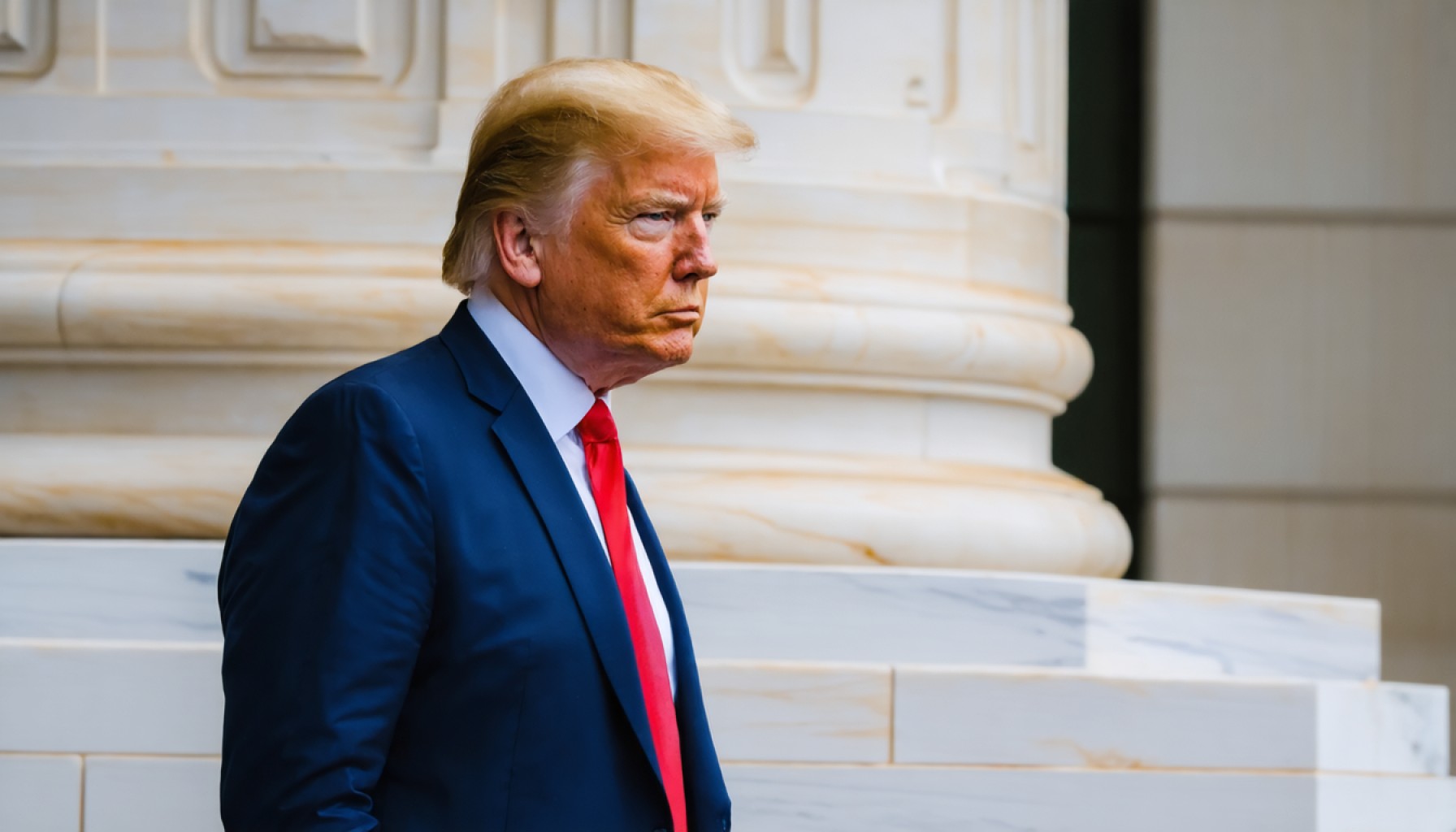- The Dow Jones, S&P 500, and Nasdaq 100 futures faced volatility after President Trump’s critical remarks about Federal Reserve Chairman Jerome Powell, leading to a significant market downturn.
- President Trump’s comments contributed to the Dow Jones Industrial Average dropping over 970 points, affecting major companies like Apple, Nvidia, and Tesla.
- Investor apprehension was fueled by strained Federal Reserve policies amidst ongoing global trade tensions and shifting economic indicators.
- Despite their industry dominance, Apple, Nvidia, and Tesla experienced marked declines, highlighting the market’s vulnerability to political discourse.
- Financial experts emphasized the importance of resilient portfolio strategies and diversified investments to navigate market unpredictability influenced by political factors.
- Investors were urged to remain informed and prepared, understanding the significant impact political rhetoric can have on economic stability.
A tempest brewed on Wall Street as futures for the Dow Jones, S&P 500, and Nasdaq 100 drifted into a nervous calm Monday night. Earlier in the day, President Donald Trump unleashed a scathing critique against Federal Reserve Chairman Jerome Powell, branding him with unflattering epithets and setting the financial markets on edge.
As the nation watched, the stock market absorbed the ramifications of presidential rhetoric. Investors recoiled, triggering the Dow Jones Industrial Average to nosedive more than 970 points. The ripple effect was swift and merciless—giants like Apple, Nvidia, and Tesla bore the brunt of the financial upheaval, each seeing notable declines in their stock values.
The market’s trepidation was not without reason. The President’s comments came at a time when the Federal Reserve’s policy maneuvers—crucial for calibrating economic stability—already strained under the weight of global trade tensions and fluctuating economic indicators. A volatile cocktail of uncertainty and verbal sparring brewed unease among analysts and investors alike.
As Apple grappled with the markets’ volatility, its status as a tech behemoth did little to shield it from the storm’s impact. Likewise, Nvidia and Tesla, visionaries in their respective domains of semiconductor technology and electric vehicles, felt the sting of investor uncertainty. For these titans, the day’s descent underscored a sobering truth—the market’s fragility in the face of unexpected political spats.
Meanwhile, seasoned traders and financial experts advised caution and breadth of perspective amid the swirling turbulence. They recognized the episode as yet another chapter in the volatile relationship between political influence and market performance, stressing the importance of resilient portfolio strategies and diversified investments.
So, as the sun set and markets prepared to reopen, the imperative was clear: Navigating today’s financial world demands more than just an eye on the numbers. It requires a keen awareness of geopolitical undercurrents and an adaptable approach to economic headwinds. The take-home message for global investors remains steadfast amid the din: Be informed, be prepared, and never underestimate the power words might wield over the reflective surface of economic prosperity.
The Untold Impact of Political Rhetoric on Financial Markets
Understanding Market Volatility: More Than Just Numbers
In a dramatic turn on Wall Street, the financial markets reeled from the impact of political discourse, as futures for the Dow Jones, S&P 500, and Nasdaq 100 entered a state of anxious flux. This fluctuation was exacerbated by President Donald Trump’s harsh critique of Federal Reserve Chairman Jerome Powell. The stock market’s reaction was immediate: the Dow Jones Industrial Average fell by over 970 points, illustrating the sensitivity of the markets to political statements.
Real-World Use Cases: How Companies Are Affected
– Apple: Despite its strong market position, Apple’s stock was not immune to the downturn. The company’s reliance on global supply chains and its exposure to international markets makes it particularly sensitive to geopolitical events.
– Nvidia: As a leader in semiconductor technology, Nvidia faces its own challenges. Concerns over trade policies affect its supply chain and international sales, playing a significant role in investor sentiment.
– Tesla: Tesla, being a pioneer in electric vehicles, relies heavily on consumer confidence and international sales. Fluctuating economic conditions and potential tariff implications can significantly impact its bottom line.
How-To Maintain Financial Resilience
1. Diversify Investments: Allocating investments across various sectors can mitigate risk. Consider including stable industries like healthcare and utilities.
2. Stay Informed: Regularly follow reliable financial news and geopolitical updates to understand potential market influencers.
3. Adopt a Long-Term Perspective: Avoid the temptation to make impulsive decisions based on short-term volatility. Historical data shows that markets tend to recover over time.
Industry Trends and Market Forecasts
– The Role of the Federal Reserve: The Federal Reserve continues to play a critical role in economic stability. However, its policies are increasingly influenced by global trade tensions and economic indicators. Analysts predict that ongoing geopolitical events will continue to shape monetary policy.
– Tech Sector Vulnerability: Despite their size and influence, tech giants like Apple and Nvidia remain vulnerable to market fluctuations. The tech sector’s dependency on global supply chains and market sensibility to geopolitical unrest presents ongoing risks.
Security and Sustainability
– Economic Resilience: Building a resilient economic strategy involves careful analysis of market trends and geopolitical developments. Investors should consider sustainable and socially responsible investments that offer long-term value.
Expert Insights and Recommendations
– According to financial experts, investors should avoid knee-jerk reactions to political news. Instead, they should focus on solid fundamentals and macroeconomic indicators when formulating their investment strategies.
– Utilizing insights from industry leaders and economists can provide clarity and guidance when facing market uncertainties.
For those seeking even more detailed insights and expert financial analysis, consider visiting The Wall Street Journal or Bloomberg for comprehensive coverage and updates.
Conclusion
In the face of political turbulence, the key to navigating financial markets lies in preparedness and informed decision-making. Stay aware, remain adaptable, and focus on the broader economic landscape to ensure that your financial strategies withstand the pressures of market volatility.
